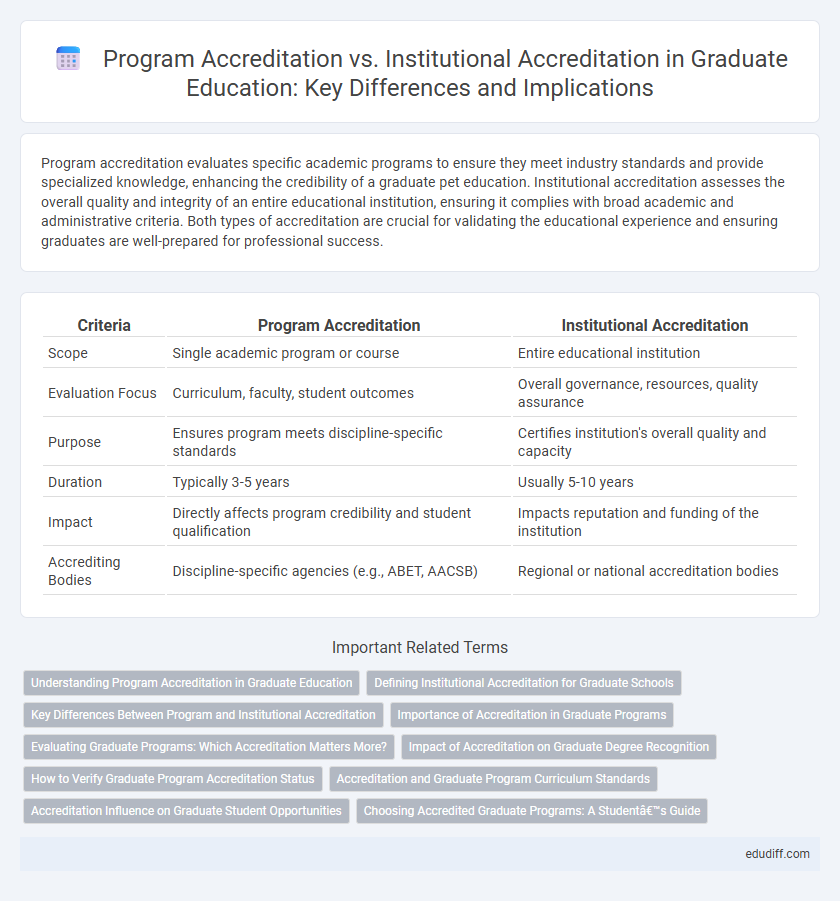Program accreditation evaluates specific academic programs to ensure they meet industry standards and provide specialized knowledge, enhancing the credibility of a graduate pet education. Institutional accreditation assesses the overall quality and integrity of an entire educational institution, ensuring it complies with broad academic and administrative criteria. Both types of accreditation are crucial for validating the educational experience and ensuring graduates are well-prepared for professional success.
Table of Comparison
| Criteria | Program Accreditation | Institutional Accreditation |
|---|---|---|
| Scope | Single academic program or course | Entire educational institution |
| Evaluation Focus | Curriculum, faculty, student outcomes | Overall governance, resources, quality assurance |
| Purpose | Ensures program meets discipline-specific standards | Certifies institution's overall quality and capacity |
| Duration | Typically 3-5 years | Usually 5-10 years |
| Impact | Directly affects program credibility and student qualification | Impacts reputation and funding of the institution |
| Accrediting Bodies | Discipline-specific agencies (e.g., ABET, AACSB) | Regional or national accreditation bodies |
Understanding Program Accreditation in Graduate Education
Program accreditation in graduate education ensures specific academic programs meet established quality standards set by specialized accrediting agencies, guaranteeing relevance and rigor in curriculum and faculty expertise. This focused evaluation contrasts with institutional accreditation, which assesses the overall quality and operations of an entire educational institution. Understanding program accreditation helps graduate students choose programs recognized for their professional credibility and alignment with industry or academic benchmarks.
Defining Institutional Accreditation for Graduate Schools
Institutional accreditation for graduate schools evaluates the overall quality and effectiveness of an entire educational institution, ensuring it meets comprehensive standards across all programs and administrative functions. This accreditation confirms that the institution maintains adequate resources, faculty qualifications, governance, and student services to support graduate-level education. It differs from program accreditation, which assesses the quality and standards of specific academic programs rather than the institution as a whole.
Key Differences Between Program and Institutional Accreditation
Program accreditation evaluates specific academic programs within an institution, focusing on curriculum quality, faculty qualifications, and student outcomes relevant to that discipline. Institutional accreditation assesses the entire educational organization, including governance, financial stability, resources, and overall educational effectiveness across all programs. Key differences lie in scope--program accreditation targets specialized fields while institutional accreditation covers the broader operational integrity and educational standards of the whole institution.
Importance of Accreditation in Graduate Programs
Accreditation ensures that graduate programs meet rigorous academic standards, enhancing the value and credibility of the degree awarded. Program accreditation specifically validates specialized curricula and faculty expertise within a particular discipline, while institutional accreditation assesses the overall quality and resources of the entire educational institution. This distinction is crucial for graduates seeking recognition, licensure, or competitive advantage in their professional fields.
Evaluating Graduate Programs: Which Accreditation Matters More?
Program accreditation specifically assesses the quality and rigor of a graduate program in fields such as engineering, business, or education, ensuring it meets industry standards and prepares students effectively for professional practice. Institutional accreditation evaluates the overall quality and operational integrity of the entire educational institution, guaranteeing that the university or college adheres to acceptable academic and administrative standards. For graduate students, program accreditation often holds more significance in employer recognition and licensure eligibility, while institutional accreditation provides a baseline assurance of the institution's credibility and federal funding eligibility.
Impact of Accreditation on Graduate Degree Recognition
Program accreditation ensures specialized graduate degrees meet specific academic and professional standards, enhancing recognition within targeted industries or fields. Institutional accreditation validates the overall quality and credibility of the entire graduate school or university, impacting the acceptance of all degrees issued by the institution. Graduates from programs with recognized accreditation are more likely to have degrees acknowledged by employers, licensing boards, and academic institutions globally.
How to Verify Graduate Program Accreditation Status
Graduate program accreditation status can be verified by consulting the Council for Higher Education Accreditation (CHEA) or the U.S. Department of Education's database, which provide comprehensive lists of recognized accrediting agencies. Institutional accreditation applies to the entire college or university, while program accreditation focuses on specific graduate programs within an institution. Prospective students should confirm that their chosen program is accredited by a specialized agency relevant to their field to ensure the quality and recognition of the degree.
Accreditation and Graduate Program Curriculum Standards
Program accreditation ensures that specific graduate programs meet rigorous curriculum standards tailored to the discipline, emphasizing learning outcomes, faculty qualifications, and research opportunities. Institutional accreditation evaluates the overall quality and effectiveness of the entire educational institution, including administrative support and resources, but may not delve into detailed program-specific criteria. Maintaining both types of accreditation is essential for validating graduate program curriculum standards and enhancing the academic credibility and recognition of degrees awarded.
Accreditation Influence on Graduate Student Opportunities
Program accreditation ensures that specific graduate programs meet industry standards, directly impacting graduates' eligibility for professional licensure and employment in specialized fields. Institutional accreditation validates the overall quality and administrative capacity of the entire university, affecting the transferability of credits and access to federal financial aid for graduate students. Employers and academic institutions often prioritize candidates from programs with recognized accreditation, significantly influencing graduate student opportunities in the job market and further education.
Choosing Accredited Graduate Programs: A Student’s Guide
Choosing accredited graduate programs is crucial for ensuring quality education and wide recognition of your degree. Program accreditation evaluates specific graduate programs by specialized agencies focusing on curriculum, faculty, and outcomes, while institutional accreditation assesses the overall quality and integrity of the entire institution by regional or national accrediting bodies. Prioritizing both program and institutional accreditation can enhance your academic credentials, improve eligibility for financial aid, and increase employment prospects in competitive fields.
Program Accreditation vs Institutional Accreditation Infographic

 edudiff.com
edudiff.com